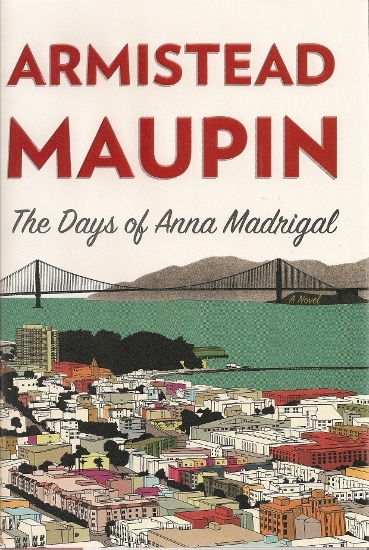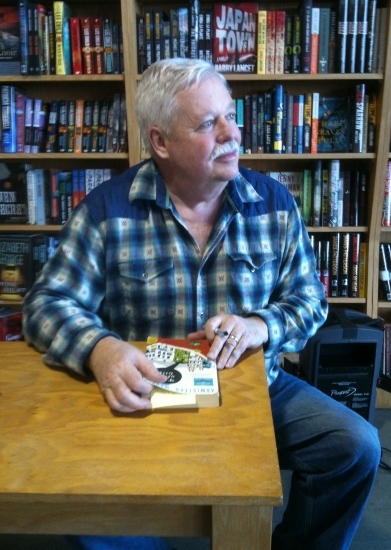Armistead Maupin's assignment was to show up at the offices of the San Francisco Chronicle every weekday morning and produce seven hundred words, give or take. But unlike most newspaper journalists, Army did not sit down to his Selectric typewriter fortified with a reporter's notebook fat with stats and quotes.
That's because Army's job was not to report the story. It was to make it up.
A biggish challenge, but Army met it with grace, most days.
It was 1976 and Army had been hired by the Chronicle to write fiction in the form of an ongoing serial, "Tales of the City." He had no facts to work from -- only his imagination and what had transpired the night before in his life as a gay man in the fun-loving, free-spirited, dope-smoking, pre-AIDs-epidemic San Francisco of the seventies.
in San Francisco. Photo c 2014 by BF Newhall
How do I know? Because I was a copy editor in the People department (what used to be known as the Women's section) where Army worked. In addition to writing the occasional feature article -- about getting into a frigid tank of water with a 1400-pound whale, for example -- it was my task to edit Army's copy.
Make that proofread Army's copy. Gordon Pates, the managing editor of the Chronicle, kept a vigilant eye on the actual content of the "Tales."
Army talked about that editing process recently at the Book Passage bookstore in San Francisco, where a SRO audience of fans had gathered to hear him read from The Days of Anna Madrigal, the latest of nine "Tales of the City"-inspired novels. The first, Tales of the City, was published by Harper & Row in 1978.
According to Army, Gordon kept a chart in his office that listed all the "Tales of the City" characters. Whenever a new character appeared, he or she was placed in the "homosexual" column or the "heterosexual" column, depending. Hoping to keep the balance, Army at one point insisted that a certain randy male dog be chalked up as heterosexual.
Army also told his Book Passage fans that he had agreed not to reveal a major plot element to Chronicle readers for the entire first year of the series -- the fact that the character Anna Madrigal, who had grown up in a Winnemucca whore house, was transgendered.
My job then, as one of the copy desk editors who read Army's stories, was simply to look out for typos as well as any stray marks on the copy paper that could confuse the scanning machines out in the composing room.
I prided myself on my editor's eye, however. And one day, as I tried to follow a string of Army's famously witty but often lengthy dialogue exchanges, I got lost. Who was saying what? Was that clever line coming from the cute gay guy Michael Tolliver? Or his wise and motherly landlady, Anna?
It took some work, but I figured it out and I quietly added an inconspicuous "he said" to one of the lines of dialogue.
To my amazement, Army noticed the change. He very tactfully brought it up with my editor, who then instructed me to refrain from editing Army's copy so heavily in the future. Armistead, I was told, was an artist. If he left off a "he said" or a "she said," he had his reasons, and the Chronicle higher-ups respected that.
Apparently, Army's writing process hasn't changed all that much in the 37 years since I tried to make that fix. To this day, he told his Book Passage audience, he is a painstaking writer who manages to squeak out maybe two pages a day.
He does not do what many writers recommend -- which is sit down, write a bunch of pages, let the story flow, then go back later to edit. Army works over his copy, sentence by sentence and section by section, he said, until he gets it right. "I compare it to laying a mosaic."
Which brings us back to young Armistead, showing up mid-morning, maybe a little late, at his desk in the People department, sometimes uncertain, if not clueless, about what he was going to write that day, but finding there a crew of equally fun-loving, equally talky young reporters and editors, ready to banter with him about their exploits and his in freewheeling 1970s San Francisco.
Army would procrastinate like this for as long as he could, until finally his deadline got his attention. On one occasion, that process was helped along when our editor, Ruth Miller, walked across the room to his desk and said, "Write!"
At this point, Army would roll a piece of copy paper into his Selectric and lose himself in the world of Michael Tolliver, Mary Ann Singleton, Anna Madrigal and their friends. And with that, a workmanlike quiet would settle upon the Chronicle's People department.
Sadly for the San Francisco Bay Area, this kindly, generous Southern gentleman of a writer (who I still think was wrong about that "he said,") has decamped with his husband to Santa Fe. There, Army said, the two can afford a good-sized house on a piece of land at the end of a road -- all within easy distance of the comforts and buzz of Santa Fe.
You'd think that with 11 novels and a TV series behind him, a writer of Army's stature could live wherever he pleased. Not so. The book publishing world isn't what it used to be. And neither are housing prices in the Bay Area.
If the couple insisted on staying in San Francisco, it would have to be in a house in a far corner of the Bay Area with a frazzling commute to keep them from the things they love in the City that made Armistead Maupin famous.
Make that -- in the City that Armistead Maupin made famous.
For more stories about Bay Area writers, go to "Heather Donahue -- How I Got Hooked on a Pothead" and "Anne Lamott on Getting Older."
The Days of Anna Madrigal, by Armistead
Maupin, Harper, 2014, $26.99 hardcover.

